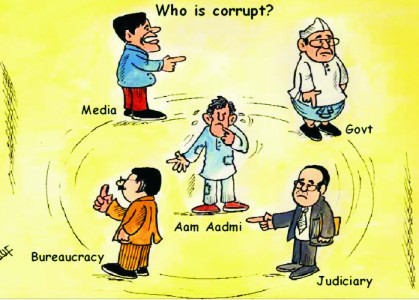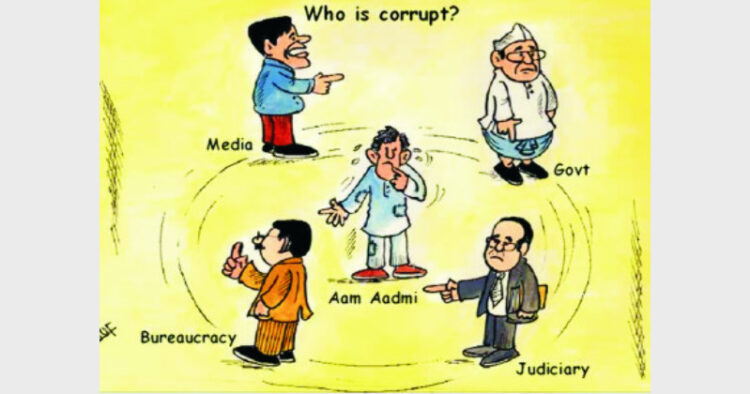
Dr S Kalyanaraman
 The regime is marked by a subversion of Indian Constitution resulting in unprecedented magnitudes of loot of nation’s wealth. This irresponsible regime, lacking in national interest should GO. Dharma has two attributes: nihshreyas (bliss) and abhyudayam (social welfare). UPA regime has failed in contributing to abhyudayam of the nation of Bharat and is a-dharmic. No a-dharmic polity can be tolerated in Bharat.
The regime is marked by a subversion of Indian Constitution resulting in unprecedented magnitudes of loot of nation’s wealth. This irresponsible regime, lacking in national interest should GO. Dharma has two attributes: nihshreyas (bliss) and abhyudayam (social welfare). UPA regime has failed in contributing to abhyudayam of the nation of Bharat and is a-dharmic. No a-dharmic polity can be tolerated in Bharat.
What happened during the Emergency under Indira Gandhi has been repeated in more subtle ways but with greater damage to the Indian polity during the UPA regime led by Sonia Gandhi.
The worst form of damage relates to the enthronement of chamchagiri as an ingredient of political behaviour. Corruption is a necessary concomitant of chamchagiri and patronage politics. Corruption scandals are but a manifestation of the rotten state of the criminalised polity.
A necessary concomitant of chamchagiri (sycophancy) is the promotion of patronage and corrupt practices in every walk of life and in particular, widely prevalent among the Politically Exposed Persons (PEPs).
Sonia Gandhi’s entry into politics after the assassination of PM Rajiv Gandhi marks a turning point in the low depths already reached by the polity, turning the polity into lower depths.
The structural foundations of the Constitution of India are Presidency, Executive led by the PM and CMs, Parliament/Legislatures, and Judiciary. The fourth estate is the media.
All the four estates have been subverted, one by one by Sonia Gandhi by making the functionaries of the four estates subservient to her interests.
Unlike Indira Gandhi who subverted the Constitution by abusing the provision for imposition of Emergency to suit her personal interests, Sonia Gandhi has subverted the Constitution without resorting to Emergency measures but simply putting chamchas (sycophants) into top positions of the institutions of governance.
It is a shock beyond belief that a national party, which had a hoary history of fight for Independence of the nation from foreign yoke should suffer a leadership, which has no express national interests but is governed only by interests of personal safety surrounded by super Z-level security.
Nationalisation of illicit wealth held by Indians abroad by PEPs
Post-colonial loot of the nation”s wealth has reached serious proportions endangering the sovereignty and integrity of the nation. Stashing away Rs 25 lakh crore of Indian wealth abroad—as reported by Director, CBI in his public speech on February 13, 2012—has created a situation of unprecedented financial instability in the country, apart from the dangers of associated terror financing.
If the rot is not stemmed immediately, with effective action by Indian Parliament, the already impoverished state of people below poverty line in the nation will seriously worsen further, which may result in a peoples” revolt of the type witnessed recently in Egypt against Mubarak and in Libya against Gadafi (both of whom had stashed away their nations” wealth abroad).
The forthcoming new regime after dislodging UPA should provide for focused attention of the Parliament on the serious financial situation the nation faces, caused by the announcement by a responsible official of the Government of India, Director CBI, that 500 billion dollars (or Rs 25 lakh crore at the rate of Rs 50 per dollar) of Indian wealth has been stashed away abroad.
Rs 25 lakh crore is a large sum of money. This is about 14 times the 2G scam, which is estimated to be about Rs 1.76 lakh crore.
If this sum of Rs 25 lakh crore is brought into the nation”s financial system, there can be a big boost to the poverty eradication programmes of the country.
There are 6,38,596 villages in the country in 640 districts (2011 census). If this amount is distributed to these 640 districts equally, each district will get Rs 3,906 crore for strengthening the Panchayati Raj institutions at the corporation, municipality and village panchayat levels for projects such as maintenance of village roads, irrigation tanks, to finance primary health care and to provide for teachers in all schools.
Forging Indian Ocean Community as Counterpoise to European Community
The funds can also be used to strengthen national security along the international borders and to forge an Indian Ocean Community as a developmental, an economic multiplier engine to finance Trans-Asian Railway and Trans-Asian Highway Projects and implement the amended Law of the Sea extending territorial waters to 200 nautical miles (as against the present 20 nautical miles from the shoreline).
Forging a National Water Grid
Another important use of the funds will be for creating a National Water Grid, which has the potential to create 9 crore of additional wet land with assured irrigation, which acreage can be distributed equitably to 9 crore landless families of the country. This will result in a veritable revolution doubling the agricultural production in about five years’ time.
Judges accuse UPA regime
The UPA regime stands accused for not implementing the National Water Grid, which has been endorsed by a three-judge bench of the Supreme Court including the Chief Justice of India Shri Kapadia. Supreme Court asked the Government to set up a panel to implement the interlinking of rivers project. UPA’s response has been an eloquent silence, true to the sphinx-like behaviour of its leader Sonia Gandhi who has yet to spell out her vision of future India.
Recurring specters of droughts in many parts of India and floods of the fierce flows of Brahmaputra should be mitigated with the set up of a National Water Grid. India has 2.5 per cent of the world’s land, most of this land is alluvial and principally requires water to improve the productivity of the land. India has 4 per cent of fresh water resources to support 15 per cent of the world’s population. By 2050, India’s population will grow to 1.6 billion, whose lives depend upon measures to double agricultural production to 450 m tonnes, by providing employment opportunities in essentially rural India. Water is being mined by farmers in nearly 100 districts, of the 400 towns, nearly 200 face water scarcity; farmers of Ramanathapuram pay Rs 5 per pot of water and many thousands of farmers reportedly committed suicide during the last 5 years due to non-availability of irrigation sources for their crop-fields. Runoff available in rivers is 1,869 BCM, of which India uses barely a third, or 690 BCM. Rainfall is asymmetric – in time and space. India can store only 225 BCM of water—or less than 14 per cent of potential. India clearly needs a well-managed, ecologically sustainable National Water Grid treating water as a national asset, not as private property or even as provincial property. Just look at the benefits created by Bhakra-Nangal dam or the Rajasthan Canal (Saraswati) Projects through interlinking of rivers, bringing Mansarovar glacier waters right upto Gedra Road, Barmer District, Rajasthan resulting in stoppage of the march of the desert. Why can’t these successes be replicated by bringing flood of waters of Brahmaputra to Kanyakumari by gravity flows (as demonstrated by National Water Development Agency). An NCAER study said that over “a 13-year period, gains of National Water Grid (with interlinked rivers) amount to more than 5 per cent of GDP on a cumulative basis” and that food grain output would jump to over 390 million tonnes.
I accuse the UPA regime of utter irresponsible behaviour in not responding to the national crisis caused by mismanagement of water resources principally fed from the devatatma Himalayas’ glaciers. One glacier, Mansarovar at the foothills of Mount Kailas and Gangotri yield the world’s 10 greatest perennial river systems of Huang-he, Yangtse, Brahmaputra (Tsongpo), Mekong, Irawaddi, Salween, Sutlej, Sindhu, Sharada, Ganga, which together sustain the lives of over 2 billion people of the Indian Ocean Community.
The following demands should be made in the Parliament in the context of the serious financial emergency-type situation (Article 360), which has arisen in the country:
• Declaration of Politically Exposed Persons” responsibility to strengthen the nation”s financial system
• Ban on participatory notes, which facilitate the hawala routes mentioned by Director CBI for the post-colonial loot of the nation”s wealth
• Nationalisation of illicit wealth stashed away abroad consistent with the suggestion made by Senior Advocate Fali Nariman in his Rajya Sabha speech.
Short of a Proclamation of Financial Emergency, there can be an orderly process to recover the illicit wealth stashed away abroad. Two months” notice can be given to owners of such assets to bring the monies into the nation”s financial system, failing which, the assets should be deemed to be national property and transferred into the Consolidated Fund of India.
RBI restrictions on the definition of PEPs to accounts of Politically Exposed Persons (PEPs) resident outside India should be revised and uniform standards should be announced to apply to both foreign and domestic PEPs. Individuals covered under Definition of Politically Exposed Persons (PEPs) for due diligence of ‘Know Your Customer’ Guidelines and Anti-Money Laundering (AML) regulations to include both domestic and foreign PEPs and their close associates and family members.
Definition of PEPs should be extended to cover all citizens of India who are individuals (and their associates) who are or have been entrusted with prominent public functions e.g., Heads of States or of Governments, senior politicians, senior government/judicial/military officers, senior executives of state-owned corporations, important political party officials, etc. This definition should govern the financial transactions to be reported by financial institutions under the KYC (Know-Your-Customer) Guidelines.
India should reconsider the special diplomatic and financial status given to tax haven countries such as Mauritius (which accounts for nearly 50 per cent of foreign fund flows into the country). Financial sanctions can be imposed in addition to specific measures. For e.g., tax haven countries should be asked to enact on the lines of the Restitution of Illicit Assets Act (2010) of Swiss Federation to assist in the restitution of illicit assets as was done recently for such assets of Mubarak, Gaddafi and earlier for the assets of Ferdinand Marcos of the Philippines.
There is need for a global approach to combat high-level, large-scale public corruption. “Public corruption erodes democracy, rule of law, and economic well-being by undermining public financial management and accountability, discouraging foreign investment and stifling economic growth and sustainable development… Corruption by senior officials in executive, judiciary, legislative, or other official positions in government can destabilise whole societies and destroy the aspirations of their people for a better way of life. (See http://georgewbush-whitehouse.archives. gov/news/releases/2006/08/20060810-1.html)
A PM should announce a similar national strategy to international efforts against kleptocracy which, like terrorism, is a threat to the governments and citizens alike.
FIU of RBI should report to other financial sentinels of the nation, all suspicious financial transactions. It is unclear if FIU has done such reporting on transactions, which have come to light in the context of the 2G scam – transactions involving, DB realty, Kusegaon, Cineyug and Kalaignar TV. Director, CBI in his speech to the First Global Programme on Anti-Corruption and Asset Recovery in Delhi said on February 13, 2012: “In some of the recent important cases being investigated by CBI such as 2G/CWG/ and Madhu Koda, we find that money is taken to Dubai/Singapore/Mauritius from where it goes to Switzerland and then British Virgin Island/Caymen Islands and other such tax havens. For the criminals all it involves is setting up of a few shell companies and then making layered transfers from one account to another in a matter of hours as there are no boundaries in banking transactions. For the investigators, however, each layer has to be peeled by sending an LR through judicial channels, and obtaining information from each leg of the transaction can take in many cases several years.”
FIU, RBI, Finance Ministry should provide information on: 1) the list of Banks, which provided information about these transactions to the FIU; 2) investigations conducted by specific agencies; and 3) details – including dates — of follow-up action.
Government should ban the Participatory Notes and institute an immediate probe on its original ownership, as suggested by the Tarapore Committee. Participatory Notes, routing hawala transactions is a major contributory cause of galloping inflation affecting the common man and further impoverishing people. National Security Adviser had warned against the terror link in stock exchange manipulation through this mechanism.
An ordinance should be issued to nationalise all foreign accounts held by Indian citizens. On the lines of the Banking Nationalisation Act of 1969, an ordinance to nationalise illicit wealth held by Indian citizens and entities in tax havens on the following lines:
Title. Nationalisation of illicit wealth held in tax havens
An Act to provide for the acquisition of the foreign currency accounts held outside India in order to serve better the needs of development of the economy in conformity with national policy and objectives and for matters connected there with or incidental there to, with particular reference to Article 39 of the Constitution.
Certain principles of policy to be followed by the State: The State shall, in particular, direct its policy towards securing…
(c) that the operation of the economic system does not result in the concentration of wealth and means of production to the common detriment…
1. Short title. This Act may be called the Foreign Accounts (Nationalisation) Act, 2011.
2. Declaration as to the Policy of the State. It is hereby declared that this Act is for giving effect to the policy of the State towards securing the principles specified in clause (c) of Article 39 of the Constitution.
Explanation–In this section, “State” has the same meaning as in Article 12 of the Constitution.
3. The acquisition is intended to enable foreign countries to restitute the illicit wealth to the Consolidated Fund of India.
4. A Custodian will be appointed with immediate effect to release the accounts held by Indian citizens and entities, which do not constitute illicit or stolen wealth—if the concerned account holders provide documents to substantiate to the satisfaction of the Custodian that the amounts held in the concerned accounts do not constitute illicit or stolen wealth.
The draft can be amplified further by legal experts by adding the usual sections such as definitions and juridical requirements.
(The writer is Director, Saraswati Research Centre, National President of Rameshwaram Ramasethu Protection Movement and former Sr. Exec., Asian Development Bank)














Comments